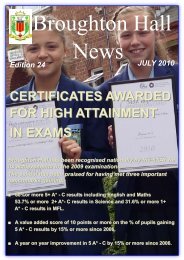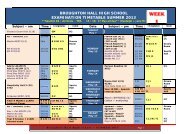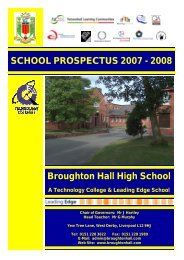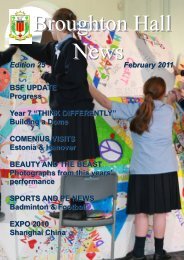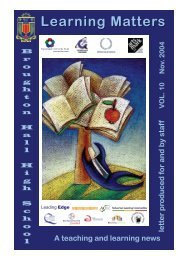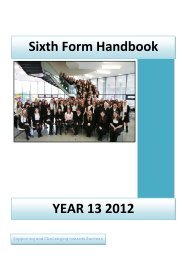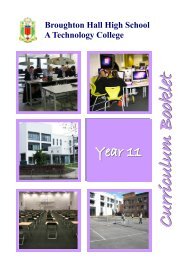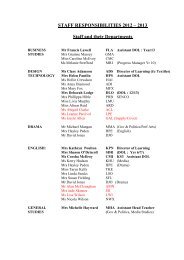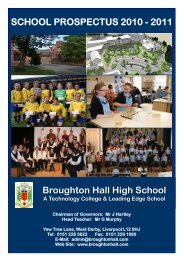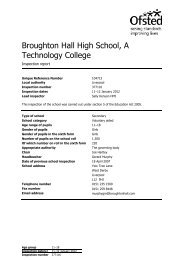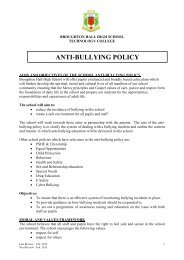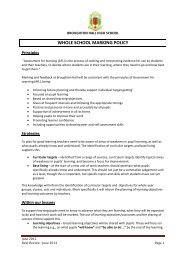Year 7 Booklet - Broughton Hall High School
Year 7 Booklet - Broughton Hall High School
Year 7 Booklet - Broughton Hall High School
Create successful ePaper yourself
Turn your PDF publications into a flip-book with our unique Google optimized e-Paper software.
2012 - 2013<br />
CURRICULUM BOOKLET<br />
FOR PARENTS<br />
Page 1 of 19
Contents<br />
What is expected in <strong>Year</strong> 7 ..................................................................................................................... 3<br />
The <strong>Year</strong> 7 Curriculum ............................................................................................................................. 3<br />
Assessment ......................................................................................................................................... 3<br />
Moodle .................................................................................................................................................... 4<br />
E-safety ................................................................................................................................................... 4<br />
What is Opening Minds? ......................................................................................................................... 5<br />
Opening Minds: I Am Unique Overview ................................................................................................. 7<br />
Opening Minds: Going Global Overview ................................................................................................. 8<br />
Opening Minds: The Play’s The Thing Overview ..................................................................................... 9<br />
Opening Minds: Faith, Hope & Charity ................................................................................................. 10<br />
Opening Minds: Now and Then ............................................................................................................ 11<br />
Opening Minds: A Sporting role ............................................................................................................ 12<br />
Mathematics ......................................................................................................................................... 13<br />
Physical Education ................................................................................................................................ 14<br />
Science .................................................................................................................................................. 15<br />
Art & Design .......................................................................................................................................... 16<br />
Music ..................................................................................................................................................... 18<br />
MFL........................................................................................................................................................ 19<br />
Page 2 of 19
What is expected in <strong>Year</strong> 7<br />
In <strong>Year</strong> 7 our priority is to ensure that pupils are settling into secondary school life, have made<br />
friends, are happy coming to school and are happy with their learning. We are conscious that a lot<br />
may have been done for them in primary school and part of our job is to make <strong>Year</strong> 7 pupils become<br />
independent learners who are organised and can use their initiative. This may take some time but<br />
the curriculum and pastoral time will aid this process. By October half term <strong>Year</strong> 7 pupils will have<br />
found their feet and will know how the school systems operate.<br />
After this time pupils start to make great strides in academic and social settings. They will have<br />
found a new set of friends from the ones they came from primary school with and should feel<br />
confident in their learning. Well motivated learners who always take advantage of<br />
The <strong>Year</strong> 7 Curriculum<br />
<strong>Year</strong>7 have 5 1 hour lessons per day. Their curriculum is designed differently from other years in<br />
order to aid transition and to lay the competences foundation for their learning in secondary school.<br />
Subjects which are taught ‘alone’ in <strong>Year</strong> 7 include Maths, Science, Art, Music, PE and MFL (modern<br />
foreign languages)<br />
Subjects which are taught in the integrated competence based curriculum called OPENING MINDS<br />
are Literacy, RE, Geography, History, ICT, Technology, PSHE and the CLIL programme for pupils in 7Bf<br />
and 7Hd.<br />
In OPENING MINDS links between subjects are made by pupils being taught in thematic modules<br />
which are delivered in half termly slots, each one lasting approximately six weeks. Six modules are<br />
taught between September and July and each one begins with a Big Picture and ends with a<br />
Celebration.<br />
The Big Picture lasts one hour and enables the pupils to understand and to ‘see’ what will happen in<br />
the six weeks which follow. The Celebration will allow each of the 10 Opening Minds groups to<br />
celebrate their learning in front of their peer group.<br />
Towards the end of the module, several days are set aside as ‘Reflection and Review’ days. These<br />
days will allow subject teachers to discuss progress and targets with each pupil in their set.<br />
Assessment<br />
PROCESS pieces of work will be completed in exercise books and will be marked with the school’s<br />
common mark scheme BUILD and should include her targets for improvement.<br />
PRODUCT pieces of work will be completed on file paper and will be kept in each pupil’s ring binder<br />
in class. These will be awarded with a National Curriculum level.<br />
ASSESSMENT in MATHS, MUSIC, ART, MFL, SCIENCE & PE<br />
Information regarding assessment in these subjects can be found on the following pages.<br />
Page 3 of 19
Moodle<br />
Moodle is our Virtual Learning Environment (VLE) it allows resources, instructions and assessments<br />
to be shown on line. It is accessible from any computer with an internet connection. This is useful is<br />
many ways, during absence it is possible to get access to all learning materials, so time can be spent<br />
productively.<br />
Each pupil has an email address and password to gain access to the VLE, they can then use all of the<br />
material provided, parents can see what their daughters are doing in class and blogs can be shared<br />
with the school community (no exterior access is permitted) or kept private to the author.<br />
A range of media is used by subjects to engage learners: video, podcasts, quizzes and surveys, more<br />
are being introduced as we improve our system.<br />
E-safety<br />
As a school we take e-safety very seriously. We have a CEOP Ambassador who builds the e-safe<br />
message into every Opening Minds module. Assemblies on the subject are regular events and we<br />
always observe Internet Safety Week.<br />
We make every effort to warn your daughter about the possible dangers of the internet and<br />
electronic communication. Making each pupil a sensible, mature and knowledgeable user of<br />
Information Technology is one of the main objectives of our curriculum.<br />
Page 4 of 19
What is Opening Minds?<br />
A competence based curriculum<br />
The 5 competences which <strong>Year</strong> 7 will be introduced to this year are:<br />
1. Citizenship<br />
2. Learning<br />
3. Managing Information<br />
4. Relating to people<br />
5. Managing situations<br />
A competence based approach enables pupils not just to acquire subject knowledge but to<br />
understand, use and apply it within the context of their wider learning and life. It also offers pupils a<br />
more holistic and coherent way of learning which allows them to make connections and apply<br />
knowledge across different subject areas.<br />
The competences listed above will underpin the content and knowledge that is included in the 6<br />
modules. These modules are:<br />
1. I am Unique (September to October half term)<br />
2. Going Global (October half term to Christmas)<br />
3. The Play’s the Thing (January to February half term)<br />
4. Faith Hope & Charity ( February half term to Easter)<br />
5. Then & Now (Easter to Whit half term)<br />
6. A Sporting Role (Whit half term to July end of year)<br />
These modules will be studied using a wide variety of skills which can be found on the following<br />
page. The content of these modules will be explored through the skills which can be found on the<br />
next page. These skills become part of the PROCESS (home works and class works) and will<br />
contribute to the completion of the PRODUCT (Milestone piece)<br />
Page 5 of 19
Page 6 of 19
Opening Minds: I Am Unique Overview<br />
Literacy<br />
You will develop your writing skills. You will learn<br />
about the features of autobiographical writing<br />
(Inform/Explain/Describe)and use these to create a piece<br />
of writing. You will also read the novel 'Skellig' by David<br />
Almond.<br />
RE<br />
You will learn about how God created you as special and unique, and what it means to belong to the<br />
Christian community.<br />
History<br />
You will produce a timeline of the eleven years of your life so far. The timeline will be to scale, fully<br />
illustrated, and contain information from your life and national and world events. You will colourcode<br />
you timeline to categorize the various important moments in your life<br />
Geography.<br />
You need to develop skills to make the connections. The skills are: Understanding Scale,<br />
Understanding Grid References, Understanding Direction, interpreting an O S map of Liverpool.<br />
Technology<br />
You will use a simple design process to analyse, research and design a coat of arms that represents<br />
who you are and what makes you unique<br />
Information Technology<br />
I.T. has revolutionised education and research, whatever we need to know we can always "Google<br />
it" to find an answer. It seems, however, that everything good has a bad side, keeping yourself safe<br />
is a difficult and complex task. You have to be aware of the danger of using the internet and be<br />
proactive in staying safe online.<br />
PSHE<br />
You will learn about your personal safety and how to avoid difficult or dangerous situations.<br />
CLiL is where a Spanish native teacher will delivers lessons in Spanish. Some pupils will be taught<br />
exactly the same content as all the other students only some of the lessons will be delivered in<br />
Spanish.<br />
Page 7 of 19
Opening Minds: Going Global Overview<br />
Literacy<br />
In this unit you will explore poetry from other cultures<br />
and traditions. You will perform a poem and learn to<br />
analyse language and imagery. You can use this to write<br />
some poetry of your own.<br />
R.E.<br />
You will be able to explain that Hinduism is another world religion apart from Christianity, and write<br />
about the Hindu story of Rama and Sita in relation to the Hindu festival of Diwali. All will also be able<br />
to describe some of the Hindu Gods<br />
Geography<br />
Geographical concepts and skills, such as map skills, places, describing and explaining and<br />
photographic analysis.<br />
ICT<br />
Globalisation is the process by which the world is becoming increasingly interconnected as a result<br />
of massively increased trade and cultural exchange. It is the result of technological changes that<br />
enable people, goods, money and above all information and ideas to travel the world much faster<br />
than ever before. We will explore the spread of Global Communications and look at what is known<br />
as 'The Digital Divide'. You will also learn about global communications.<br />
Technology<br />
In this section you will explore popular foods from around the globe. You will also investigate how<br />
what we buy is produced and the conditions of the workers who produce our food.<br />
History<br />
In this unit you are going to research What an Empire is, how big The British Empire was in 1900 and<br />
which countries it covered at that time. As an Interactive Whiteboard task research the British<br />
Empire. Then, using atlases, try to find the new countries that once formed the Empire.<br />
PSHE<br />
Will be linked to ICT here and will be the comparison of your life with one of a pupil in another<br />
country.<br />
Page 8 of 19
Opening Minds: The Play’s The Thing<br />
Overview<br />
Literacy<br />
For this unit you will be studying a play by William<br />
Shakespeare. You will explore the plot of the play,<br />
write about one of the key scenes and perform one of<br />
the scenes. You will write an analytical essay exploring<br />
Shakespeare's use of language<br />
R.E.<br />
From studying this unit you will know and understand what the Bible is. Know that the Bible is made<br />
up of the New and Old Testament, and the significance of each.<br />
You will also know about some of the characters of the Old Testament (Abraham, Moses, Joseph and<br />
David).<br />
History<br />
For the Historical element of this unit you will conduct research into Shakespeare, his life and works,<br />
and research what life was like in Elizabethan times<br />
ICT<br />
Publicity is a very important part of any theatrical production, your task is to publicise the<br />
contribution that your group is making to the play.<br />
A section about e-safety will be included, in this section you will be asked to prepare a Socail media<br />
profile for one of the characters from the play.<br />
P.S.H.E<br />
This section of personal wellbeing concentrates on health matters including: healthy eating,<br />
understanding the risks of drug/alcohol abuse. You will think about the choices you make & how<br />
they will affect your family & friends.<br />
Page 9 of 19
Opening Minds: Faith, Hope & Charity<br />
Literacy<br />
For this unit you will read the novel<br />
'Millions'. You will develop your inference skills<br />
by exploring the presentation of characters and<br />
themes within the novel.<br />
R.E.<br />
From studying this unit you will know and understand<br />
the importance of the Christian festival of Easter and how this affects the faith, hope and charity of<br />
Christians today.<br />
History<br />
In this module you will learn about the medieval church and its impact on people’s everyday lives, n<br />
about the role of monasteries and nunneries in medieval life and understand the importance of the<br />
church to life in the Middle Ages.<br />
ICT<br />
Has true meaning of Easter been lost? Many children think that Easter is all about chocolate,<br />
chicks and little bunnies. Your task is to use a combination of Paint and MovieMaker on your laptops<br />
to create a video story about the true meaning of Easter.<br />
Geography<br />
You will explore the different parts of the world and how they celebrate Easter.<br />
P.S.H.E<br />
This section of personal wellbeing concentrates your faith and how it can help you in different<br />
situations in your life.<br />
Page 10 of 19
Opening Minds: Now and Then<br />
Literacy<br />
In this module you will prepare and present a<br />
speaking and listening assignment. For this you will<br />
give a persuasive speech outlining what you believe to<br />
be the top three inventions of modern times.<br />
R.E.<br />
In this module you will learn about the historical Jesus, and what life was like in Palestine over 2000<br />
years ago.<br />
History<br />
At the end of this module you will have: a greater understanding of the function of Castles, and<br />
appreciate why their design and purpose changed over time, have visited Conway Castle, have<br />
learned how to analyse historical sources and use appropriate vocabulary .<br />
ICT<br />
You will compile a one page document of bullet point facts about Conwy. To do this you will use at<br />
least three different sources and referenced them. You will then turn the information collected into<br />
an attractive leaflet aimed at primary school pupils. Throughout this section you will avoid<br />
plagiarism. You will be introduced to databases and use one to answer questions.<br />
Geography<br />
You will learn that settlements are not just built in places at random but there are a number of<br />
LOCATION FACTORS involved. You will be able to identify reasons for location of Conwy Castle and<br />
present findings on one landmark in Liverpool.<br />
P.S.H.E<br />
You will complete a SEAL task. You need a relaxed atmosphere, a quite environment and the ability<br />
to simply listen.<br />
Page 11 of 19
Opening Minds: A Sporting role<br />
This is an Opening Minds, P.E. collaboration which will see pupils from each O.M. group represent an<br />
sporting country. Pupils and teachers will prepare themselves to take part in a competition that<br />
will allow them to meet personal goals and celebrate A Sporting Role model, each of us will seek "to<br />
be the best that they can be."<br />
Literacy<br />
You will complete a piece of writing that explores a sporting role model.<br />
R.E.<br />
You will learn the importance of a special place; you will explore the design and purpose of a church<br />
building. The importance of worship in a church will be explain and the importance of the Sabbath<br />
for Christians will be discussed with reference to sporting participation.<br />
History<br />
An Olympic and sporting milestones timeline will be completed as part of a group.<br />
Geography<br />
Sporting barriers and boundaries, global travel and sustainability will be investigated.<br />
ICT<br />
During this part of the Olympic module you will be recording your fitness and showing whether it<br />
changed during the 6 weeks of this module. You will be recording data during our own Olympics,<br />
recording some of the events, all of the results and then reporting on them using multimedia<br />
Technology<br />
Your design technology project will be to research, design and make Olympic inspired products.<br />
You will be researching and designing, what keep athletes healthy, a logo to represent the games, an<br />
original Olympic medal and bunting to celebrate the event. During this project you will be spending a<br />
day in the Design Technology workshops making some of the products you have designed.<br />
PSHE<br />
You will analyse Social Media and its impact on society. You will then be asked to create a mock-up<br />
of a social media page that advertises your event. This can be done on computer or on paper.<br />
Page 12 of 19
Mathematics<br />
AUTUMN TERM<br />
Multilpes, factors, primes, LCM,HCF<br />
Directed numbers<br />
Sequences and number patterns<br />
Angles and parallel lines. Angles properties<br />
Probability<br />
Ratio and proportion<br />
Algebra<br />
Measures and mensuration; area and perimeter<br />
Learning Review Exams DECEMBER<br />
SPRING TERM<br />
Co-ordinates and graphs<br />
Four rules of number<br />
EQUIPMENT<br />
Pen (Black ink), Pencil<br />
Ruler, Protractor and<br />
Compass<br />
Calculator (Casio fx-<br />
85GT PLUS- Black, Blue<br />
or Pink)<br />
Coloured pencils.<br />
Electronic Homework<br />
1. www.mymaths.co.uk<br />
Login<br />
yew<br />
Password yellow (for September<br />
2012, this will change yearly and pupils will be<br />
advised).<br />
Fractions (1) and decimals (1)<br />
Transformations<br />
Places value and approximations. Use of a<br />
calculator<br />
Statistics<br />
SUMMER TERM<br />
Fractions (2), decimals (2) and percentages<br />
Measure, mensuration and 3D shapes<br />
Calculations and checking, order of operations<br />
Geometrical reasoning and mensuration<br />
Statistical enquiry, types of data<br />
Each pupils will have their own individual login<br />
via their ‘Portal’. So that individual homework<br />
and be set and assessed.<br />
2. MOODLE<br />
http://www.broughtonhall.com/moodle/file.php<br />
/669/student/html/materials.html<br />
Main assessment times and examinations<br />
All pupils will assessed using National curriculum<br />
levels and sub levels a,b,c within those.<br />
Examination times will be December and May.<br />
Paper 1 non-calculator. Paper 2 calculator.<br />
Volume and surface area<br />
Homework<br />
Homework be set each week and will be<br />
Review of angles<br />
appropriate for the ability group, it may be<br />
Learning Review Optional Tests May/June written, electronic , research or nearer<br />
examination times consolidation and revision.<br />
Assessment will be accordance with the school marking policy of the BUILD system.<br />
Page 13 of 19
Physical Education<br />
During year 7 pupils will be introduced to a wide variety of sports and activities. They will<br />
begin to learn the necessary skills and techniques, and will learn how to apply them in each<br />
of the different activities. They will start to understand what makes an effective<br />
performance and how to apply these principles to their own and others' work. They will<br />
learn to take the initiative and make decisions for themselves about what to do to improve<br />
performance. They will be introduced to the role of ‘performer’ and other roles such as<br />
‘leader’ and ‘official’.<br />
The programme of study identifies four areas of activity:<br />
dance activities;<br />
games activities;<br />
gymnastic activities;<br />
athletic activities;<br />
Pupils at <strong>Broughton</strong> <strong>Hall</strong> will cover the following 12 areas of activity in curriculum time each<br />
year at KS3.<br />
dance activities<br />
games activities<br />
1. invasion games<br />
2. striking and fielding games<br />
3. net/wall games<br />
gymnastic activities<br />
1. educational gymnastics<br />
2. cheerleading<br />
athletic activities<br />
Pupils will be assessed on their ability to apply skills in isolation, and also on their ability to<br />
apply those skills in competitive and compositional situations. Pupils will be assessed on<br />
knowledge and understanding of basic rules and tactics to outwit an opponent.<br />
<strong>Year</strong> 7 pupils will receive 2 PE lessons each week throughout the year, and will have<br />
opportunities to attend a wide range of clubs in extra-curricular time including: netball,<br />
hockey, dance, football, rounders, athletics, handball, trampolining, etc.<br />
Page 14 of 19
Science<br />
In Key Stage 3 all students who study Science will learn the key skills of completing practical work<br />
safely whilst studying a broad range of topics covering biology, chemistry and physics. Students are<br />
set both individual and group tasks on which they are assessed. The tasks vary from giving<br />
presentations to the class, to analysing results collected from investigations.<br />
Targets for science are set using the teacher assessment levels from their primary schools. Students<br />
are formally assessed at the end of every topic (i.e. every 6 weeks). Whilst studying each module<br />
students are also asked to complete a Milestone task. Each student can track her progress using a<br />
Record of Achievement that is completed at the end of every module. This allows the pupil how<br />
much progress they have made during that topic, as well as how much progress they have made so<br />
far over the academic year. All assessments are evidenced using the Records of Achievement as well<br />
as written feedback on their milestone tasks. Students can expect to receive individual verbal<br />
feedback during lessons as well as comments on areas to improve at the end of every topic.<br />
Homework is set twice a week.<br />
We are currently revising our extra curricular activities for KS3 students<br />
Science <strong>Year</strong> 7 Curriculum and Assessment Information<br />
<strong>Year</strong> 7 Curriculum consists of 5 themed Schemes of work entitled<br />
I am Unique<br />
Going Global<br />
Fizz, Bang, Pop<br />
Now and Then<br />
The Play’s the Thing<br />
All Schemes of work are taken from the National KS3 Programme of Study and are assessed by both<br />
End of Unit tests and longer Milestone pieces of work. There will also be an End of year Exam which<br />
will also be part of the overall Teacher Assessment level on completion of year 7.<br />
Page 15 of 19
Art & Design<br />
Delivery:<br />
Pupils study Art one lesson per week. Pupils are taught in form groups.<br />
Homework:<br />
Homework will be given for each task. It will be 1 per week or 1 every 2nd week depending on<br />
the length of the task the student is completing. Pupils who hand in work late will receive<br />
detention by the subject teacher.<br />
Equipment:<br />
It is essential that all pupils bring the correct equipment to lessons.<br />
Over the year this list will include the following: Pen, pencil, ruler, a rubber & colouring pencils.<br />
Attendance:<br />
Excellent attendance and punctuality are vital for progress in Art and design.<br />
Who to contact:<br />
You can communicate with the Director of Learning for Art and Design technology in writing,<br />
email or by phone.<br />
Curriculum overview:<br />
Term 1<br />
Theme – Line, Tone and Form.<br />
Pupils will study the basic elements of art and design. They will explore this theme by using<br />
pencil only, concentrating on the use of line gained by using a pencil, how tone can be achieved<br />
by using a pencil as well as drawing forms and applying tone to gain a 3D look and feel to their<br />
drawings. Pupils’ final outcome will be a 3D carved soap sculpture. The artist studied will be<br />
Barbara Hepworth.<br />
Term 2<br />
Theme - Colour Theory<br />
Pupils will explore Colour Theory by developing and exploring both primary and secondary<br />
colours. The media used will be coloured pencils (skill gained – blending) and paint (skill gained –<br />
mixing of colours/wet process). Pupils will also learn about hot and cold colours. Pupils’ final<br />
outcome will be a 2D robot. The artist studied is Eduardo Paolozzi.<br />
Term 3<br />
Theme - Culture<br />
Pupils will explore a Culture project, culture studied – Aboriginal Art. Pupils will research into the<br />
background of this ancient culture, by concentrating on its origins. Pupils will explore paint<br />
techniques used by the aborigines and experiment by creating their own designs in the style of<br />
Aboriginal art. Pupils final outcome will be a handprint design with symbolism that they link to<br />
their own personal life in school such as subjects studied, extracurricular activities, lunch etc.<br />
Artists’ studied are contemporary and ancient aboriginal artists’.<br />
Page 16 of 19
Assessment:<br />
Pupils will be given a target grade at the beginning of year 7<br />
Pupils will complete a base line assessment at the start of each term.<br />
Pupils will be assessed for each task by the teacher.<br />
This will be in the form of ‘BUILD’ grades. The final outcome will be levelled.<br />
Pupils will carry out peer and self-assessment.<br />
Pupils will receive a project level each term. These levels will then generate an overall level at<br />
the end of year 7.<br />
What makes a successful learner in Art & Design:<br />
Being organised<br />
Good attendance and being punctual to all lessons<br />
Bringing the right equipment to lessons<br />
Following the teachers instructions<br />
Acting on teachers feedback<br />
Having a positive attitude<br />
Being a good listener<br />
Not being afraid to get things wrong<br />
Always trying your best<br />
Doing your homework on time<br />
Being able to share ideas and knowledge<br />
Good concentration<br />
Asking for help when you need it<br />
Perseverance<br />
Acting on both verbal and written feedback given<br />
Experimenting<br />
Problem solving<br />
Page 17 of 19
Music<br />
In Key Stage 3 all students who study Music will learn the key skills of listening, performing and<br />
composing and will do so with academic rigour. They will learn to read music, play instruments<br />
(keyboard and tuned percussion) and use Logic software on iMacs to explore and develop their<br />
skills.<br />
Students can expect to be formally assessed every 4-8 lessons. Music teaching varies across<br />
primary schools and so students’ Music levels are often lower than their English/Maths levels<br />
throughout Key Stage 3. Targets for Music are set in December of <strong>Year</strong> 7 to allow staff time to<br />
assess students’ current knowledge, skills and co-ordination. Each student can track her<br />
progress using her Music Progress <strong>Booklet</strong> where she can find information about what she is<br />
learning and record her targets and achieved levels. All assessments are evidenced in recordings<br />
(video and audio) and the Progress <strong>Booklet</strong>. Students can expect to receive individual verbal<br />
feedback plus a written target at least once every 6 lessons. Homework is set when appropriate.<br />
Extra-curricular opportunities for KS3 students include:<br />
Choir (for everyone) 1-2 Lunchtimes per week Miss Hayes<br />
Concert Band (for students 1 after school per week Miss Ellison<br />
who already play an<br />
instrument)<br />
Guitar Group (for<br />
1 Lunchtime per week Mr Carey<br />
beginners)<br />
Woodwind Group (for<br />
1 Lunchtime per week Mr Jones<br />
students who already play<br />
woodwind)<br />
Guitar Ensemble 1 after school per week Mr Carey<br />
Instrumental lessons<br />
(parental contribution<br />
required; please ask for<br />
further details)<br />
1 half hour per week Various tutors in Strings,<br />
Woodwind, Brass, Guitar,<br />
Drum Kit, Piano and Voice.<br />
Contact Ms Kelly in the<br />
<strong>School</strong> Office for details.<br />
MUSIC: Our Core Values<br />
These are the values we are expected to keep as musicians in <strong>Broughton</strong> <strong>Hall</strong>.<br />
Page 18 of 19
MFL<br />
In <strong>Year</strong> 7 most students will follow the Listos 1 course.<br />
CLIL students will follow a fast-track course called Mira 1 Express.<br />
All will study a module per half-term and will be given an assessment, or 'Prueba' at the end.<br />
Assessments cover the four skill areas of Speaking (AT1), Listening (AT2), Reading (AT3) and Writing<br />
(AT4). Teachers will also assess pupils in these areas in lessons.<br />
The majority of students will come to Spanish as a brand new subject, or with a little basic<br />
knowledge. As MFL is a new core subject at Key Stage 3 please be aware that Target Levels in this<br />
subject are often lower than in other subjects.<br />
General Learning Objectives<br />
Developing capability and confidence in listening<br />
Sustain perseverance and concentration when listening to speech containing familiar<br />
language used in new contexts<br />
Talking together<br />
Initiate and participate in unrehearsed pupil-teacher and pupil-pupil exchanges<br />
Develop and improve sentences by adding, rearranging or replacing elements<br />
A selection of the modules that we cover:<br />
Module 1:<br />
Greeting people in Spanish<br />
Saying & spelling your name<br />
Naming things in your bag<br />
Saying what you have / have not<br />
Numbers<br />
Saying how old you are<br />
Saying the date<br />
Saying when your birthday is<br />
Learning the Spanish alphabet<br />
Module 2:<br />
Saying where you are from<br />
Saying what nationality you are<br />
Saying where you live<br />
Forming present tense verbs<br />
Talking about your family<br />
Talking about pets<br />
Describing pets<br />
Describing hair and eyes<br />
Describing size and colouring<br />
Module 3<br />
Talking about school subjects<br />
Expressing likes & dislikes<br />
Giving opinions<br />
Telling the time<br />
Talking about your school timetable<br />
Talking about mealtimes<br />
Saying what you eat and drink<br />
Describing school<br />
Saying how you get school<br />
Page 19 of 19



